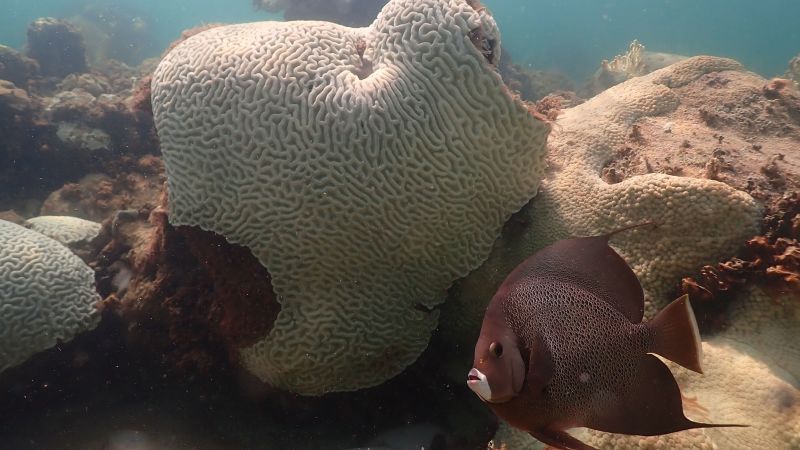Urgent Rescue Operation Underway to Save Florida Coral Species from Extinction
Florida’s coral reefs are in grave danger. Unprecedented water temperatures have triggered a mass bleaching event and die-off, putting these vital ecosystems on the brink of extinction. The situation is dire, and urgent action is needed to save Florida’s coral species.
Rapid Escalation of Bleaching and Death
In just a matter of weeks, multiple reefs in the Florida Keys have experienced complete bleaching or death. Coral experts are predicting that the bleached reefs will face “complete mortality” within a week. Even reefs at greater depths are at risk if the ocean warmth continues to escalate.
Unprecedented Ocean Warmth
Florida is experiencing extreme heat, with some of the highest water temperatures ever recorded. A buoy in the Florida Bay registered a scorching temperature of 101.1 degrees Fahrenheit at a depth of 5 feet. Other stations in the area reached temperatures as high as 99 degrees. These conditions are putting immense pressure on the coral reefs.
Coral’s Sensitivity to Temperature Changes
Coral is highly sensitive to temperature changes, and prolonged exposure to high temperatures causes them to bleach and eventually die. The current heatwave has pushed water temperatures well into the 90s, devastating the coral. This drastic increase in temperature is a death sentence for these fragile organisms.
Devastating Impact on Coral Reefs
Reports from the Florida Aquarium and the Coral Restoration Foundation paint a grim picture. The coral at the Florida Aquarium’s managed reef went from being completely healthy to completely bleached and 80% dead within just two weeks. Sombrero Reef off the coast of Marathon in the Florida Keys experienced “100% coral mortality.” The loss of coral reefs is comparable to the rainforest losing all its trees, with far-reaching consequences for the entire ecosystem.
The Race to Save Florida’s Coral
The urgency to save Florida’s coral is clear. Without immediate action, these vital ecosystems could be lost forever. Efforts are underway to rescue and relocate coral species to safer areas, where they can hopefully recover and thrive. However, the unprecedented nature of this event poses significant challenges.
The Underwater Version of a Rainforest Disappearing
Keri O’Neal, the director and senior scientist at the Florida Aquarium, aptly describes the situation as the underwater version of the rainforest disappearing. Corals play a fundamental role in supporting a diverse range of marine life, and their loss would have far-reaching consequences.
Conclusion
The current mass bleaching event and die-off in the Florida Keys is a dire situation that demands immediate attention. The fate of Florida’s coral species hangs in the balance, and urgent rescue efforts are underway. The loss of these vital ecosystems would have devastating consequences for marine life and the overall health of our oceans. It is crucial that we take action now to protect and preserve these fragile and irreplaceable coral reefs.
Coral Reefs in Florida Keys Suffering from Severe Bleaching
The Florida Keys are facing a coral crisis. Andrew Ibarra, a NOAA monitoring specialist, recently made a distressing discovery at Cheeca Rocks, his favorite reef off Islamorada. The entire reef was bleached out, with every single coral colony exhibiting signs of paling, partial bleaching, or full-out bleaching. Some corals had already died. The situation is dire.
Katie Lesneski, the monitoring coordinator for NOAA’s Mission: Iconic Reefs, also found two more reefs with high mortality rates. However, she discovered a glimmer of hope on a dive in a deeper reef, where only 5% of the coral was starting to bleach. But even these corals are at risk if the intense water temperatures persist.
The photographs and videos of the bleached coral are truly horrifying, serving as a stark reminder of the urgent need to address climate change and protect our precious coral reefs.
Reef Restoration: Saving Coral from Extinction
Reef restoration experts are taking drastic measures to save genetically important coral species from the devastating effects of extreme heat. In a race against time, scientists are plucking these corals from their nurseries and relocating them to land, where they will be protected from the rising ocean temperatures.
The urgency of the situation is clear. “Scientists are just really scrambling to keep what we have alive,” says one expert. Among the corals being saved are the Staghorn and Elkhorn, both classified as “threatened” under the Endangered Species Act. The loss of these corals would have a devastating impact.
Already, over 1,500 corals have been saved, with the number expected to grow to 5,000 or more as the rescue operation continues. However, the situation remains critical, and up to 10% of the coral is dying at the lab.
The fight to save coral reefs is a race against time, and the stakes couldn’t be higher. By taking these extraordinary measures, scientists hope to preserve these genetically important corals and ensure the survival of these vital ecosystems for future generations.









